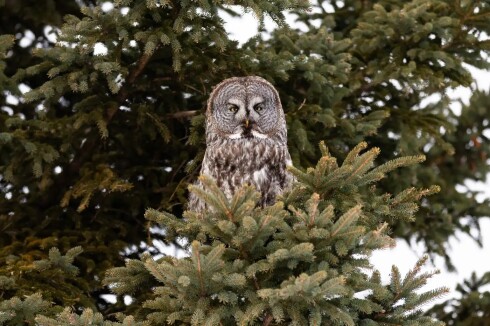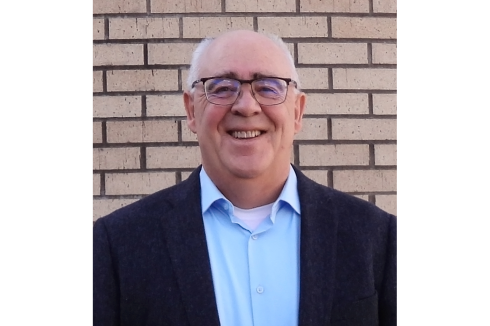MANKATO, Minn. — Grant Breitkreutz was already feeling emotional before the video started to play. When it came time for his part of the acceptance speech, he paused and let his wife take over.
Dawn and Grant Breitkreutz, of Redwood Falls, were selected as the recipients of the inaugural Minnesota Leopold Conservation Award. They received the honor surrounded by family, friends and a semicircle of regenerative agribusiness booths on Tuesday, Dec. 3, at the Premier Soil Health Event in Mankato, hosted by the Minnesota Soil Health Coalition.
ADVERTISEMENT
"This is anytime we get up and talk about soil health," Breitkreutz said after the ceremony. "It goes right here, right to the heart."
The couple, who will get a $10,000 check along with the trophy, own and operate Stoney Creek Farm . When Grant took over the family farm in 1996, things were not good. The conventional model wasn't working for them, Dawn Breitkreutz said, as they were on their way to being broke and "strongly contemplating quitting farming."
Instead, they dove into regenerative agriculture long before it was called that, with a simple goal of having healthier cows and more to feed them. They "tiptoed" into pasture management, which years later turned into substantial cropland.
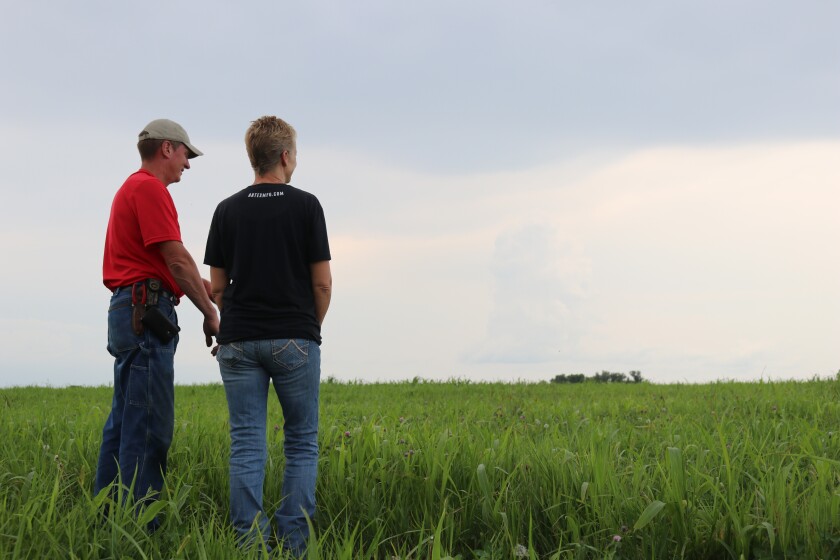
"I guess we kind of rethought things, and we started realizing that we were more about generating life here, as well as generating an income, rather than having to kill things to make that income," she said.
The road came with many breakdowns, which are to be expected when trying something new, and the couple shared their trials and errors with the community interested in going the same path.
"God's plan for us has been a winding path that included many experiments, stumbles, wrong turns and absolute dumpster fires," Dawn Breitkreutz said in their acceptance speech. "But his plan has also included meeting so many wonderful, interesting and helpful people."
Today, the Breitkreutzes manage nearly 1,800 acres of diverse crop rotations of corn, soybeans, oats, cereal rye and alfalfa across Redwood and Renville counties. Each is grown with a cover crop and no-till system. They also raise 100 Red Angus cow-calf pairs that rotationally graze on 675 acres of pasture and fields of cover crops throughout the year.
ADVERTISEMENT
A Leopold winner in Minnesota
The Leopold Conservation Award honors farmers and forestland owners who go above and beyond in their management of soil health, water quality and wildlife habitat on working land. This is the first year the award was given in Minnesota.
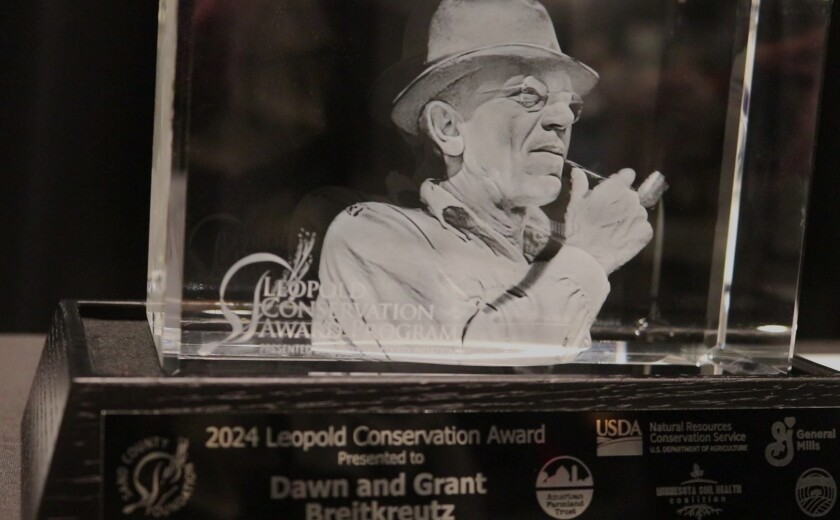
Lance Irving, vice president of the Sand County Foundation and director of the Leopold Conservation Award program, said Minnesota's agricultural and conservation groups rallied together to bring the award to the state.
"We want to make sure that we've got local state involvement, and sometimes it takes just people to see the good that it does in neighboring states and the right people get interested in it, and a coalition was built," Irving said of the Minnesota partners led by Minnesota Soil Health Coalition and Soil Regen.
Mark Gutierrez, executive director for the Minnesota Soil Health Coalition, said it's been a "true honor" to work with the Breitkreutzes.
“Their willingness to share what they have learned on this journey and the countless hours they put into helping others is humbling and inspiring,” he said.
The award is given in honor of renowned Wisconsin conservationist Aldo Leopold, who in his influential 1949 book, “A Sand County Almanac,” called for an ethical relationship between people and the land they own and manage. Irving said the book is still a driving force for the foundation and award program today.
"Farmers and ranchers and foresters aren't necessarily the problem; they're part of the solution," he said. "If we use the tools that Leopold described in the land ethic of doing right by the land because it's the right thing to do, then not only can we not harm the land, we can heal the land."
ADVERTISEMENT
Irving said he still picks up Leopold's book when he's looking for inspiration.
"I find reading 'A Sand County Almanac' makes me stop and just observe what's going on in my own environment for just that extra half-second, and if people just take that extra minute or two, just be quiet and look outside and look at the marvels of nature and look at what's possible, I think many people are inspired," he said.
Land needs rest
Grant Breitkreutz said he expected to be choked up for the ceremony because it was a long road to get there.
"Just because this is our passion, and then to look around and see all these other producers in here that deserve it just as much as we do, that are doing as much or more than we are, it's just incredible," he said.
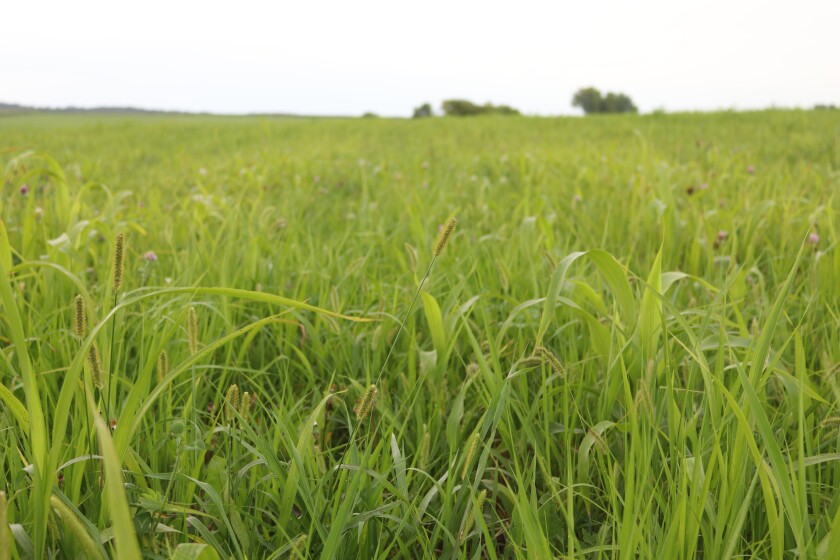
It wasn't so much their farm's story that got to him, but the perspective given by landowner Susan Chapin-Strike, who credits the Breitkreutzes for saving her farm.
"As we've gone down this path, the one thing that we've noticed has happened is that absentee landowners, or even landowners that still live on their farms, are noticing what soil health is about," Breitkreutz said. "Sue came to us four years ago and asked if we could help fix her farm.
Chapin-Strike was surprised that Breitkreutz took the time to hear her out when she asked him to farm her land, which was in bad shape. Breitkreutz told her that his wife didn't want to take on any more farmland, but that if he could get her there, she might see the potential. And she did.
ADVERTISEMENT
"I was so elated that we shook hands and said we can make this work. And Dawn said to me, 'We'll get your land back for you,' " Chapin-Strike said. "I think every time I saw them for the first two years, I would say, I can't tell you how happy I am that you're here."
Soil testing found little life left on the land, and the pasture left a lot to be desired.
"They looked at it and they said, this needs to rest," Chapin-Strike said. "For the first year that they were here, they paid the rent, but they never brought animals up because they wanted to let the land rest and recover from what it had gone through. And the second year they came up, they thought they would be able to bring animals up. Gabe (Brown) was with them, and said, you know, it would be a lot better if you let it rest for another year. And they did. To me, that's a true spirit of having empathy with the land, of caring so much and understanding what the land has to bring."
"That's what got to me in the video. That got me, working with Sue and to see her getting younger the longer we're there, and more life coming back to her farm and her ranch," Breitkreutz said.
The other Minnesota landowners nominated for the award were finalists: Hannah Bernhardt, of Finlayson in Pine County; Tom Cotter, of Austin in Mower County; and Meadowbrook Dairy, of Sartell in Stearns County.















